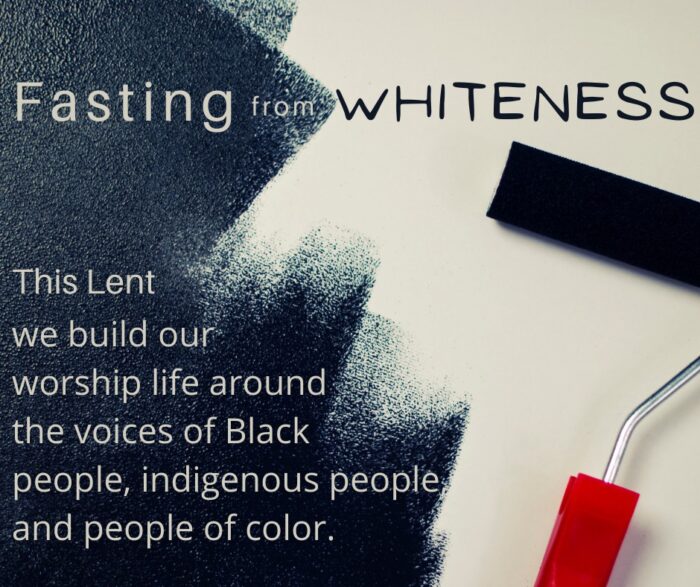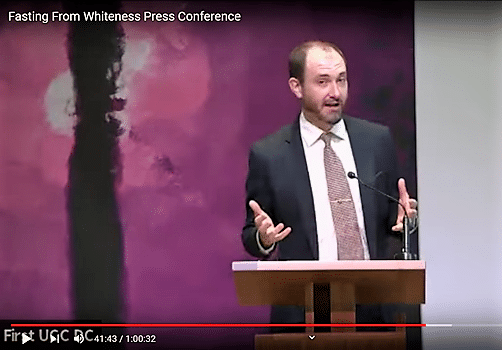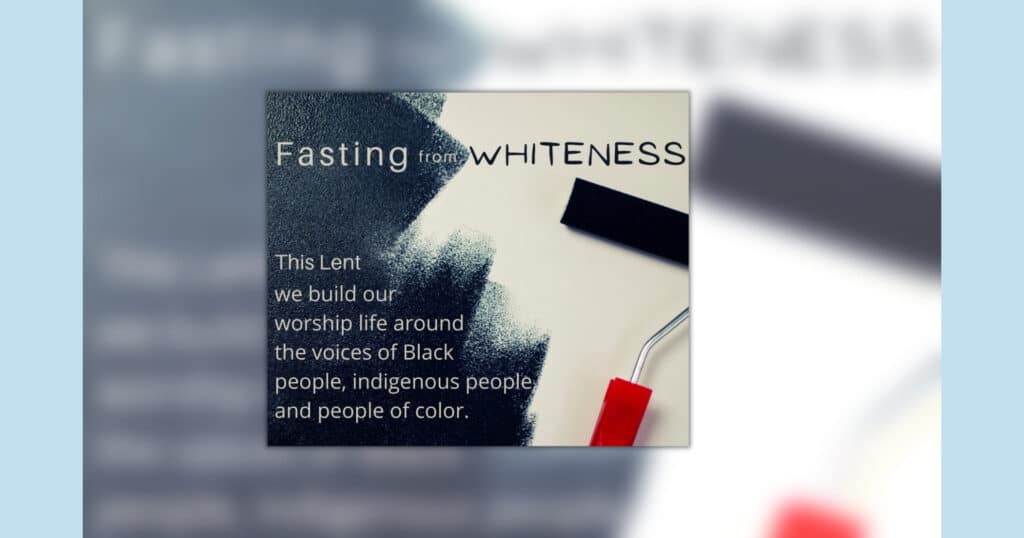Church’s ‘fast from whiteness’ draws criticism, hate — but also ‘wise’ support
“We didn’t just touch a nerve. We touched a wound.”
That’s how the Rev. John Edgerton described the firestorm of response that greeted First United Church of Oak Park, Ill., and its Lenten project, “fasting from whiteness.”
The predominantly white congregation in suburban Chicago has been working against racism for some time. It is affiliated with the United Church of Christ and the Presbyterian Church (U.S.A.) and has used resources from both.

This 40-day fast was part of that work. For Lent, the people of First United built their worship around music — and other contributions — of Black people, Indigenous people and other people of color. They weren’t banning white or European music. They were just giving it up for 40 days to highlight other traditions.
As Edgerton put it, he personally still likes Bach, Mozart and other European composers. For him, that was one point of the fast. “You don’t fast from things that are despicable,” he told the Chicago Sun-Times. ” … You don’t fast from things that are ugly. You fast from those things that do tug at your heart.”
‘Excuse me, what?’
That’s not how one right-wing website saw it.
Turning Point USA noticed the church’s Lenten lawn sign and Facebook posts. “Excuse me, what?” it asked in a video that accompanied an article about the fast. Turning Point, which calls itself a website for “community organizers of the right,” concluded that a fast from whiteness could only mean one thing: “creating a lot of disunity by separating people based on the color of their skin.”
Other national media, including The New York Post, picked up the story and took similar angles. The church got more than 1,000 hateful emails and voice messages in a single day, Edgerton said.
But there were people who rallied to the church’s side, too. They sent thank-you messages via Facebook and email — and even flowers and cookies.
Support from faith leaders
And on April 13 — smack in the middle of Holy Week — a half-dozen religious leaders gathered in person and online to express their support. They elaborated on the wound Oak Park had touched. And they answered critics.
The news conference was recorded and can be viewed here, at the YouTube channel of First Congregational UCC, Washington, D.C., which hosted it.
In introducing the news conference, the Rev. Amanda Hendler-Voss, senior minister of First Congregational, said it’s important to counter the kinds of criticisms First United has received. “We’ve been told that to speak openly about racism and the way it harms us, the way it distorts and disfigures the souls of white folks as well as Black folks and other people of color, is taboo,” she said. “We’ve been told there’s no way to talk about this without making white people feel badly, and we certainly cannot discuss it with our white children without inducing shame.
“Today we come together as faith leaders to say that the wise heart, the healthy soul, not only can withstand this discussion but depends upon it.”
‘Not fasting from white people’
Here are some of the insights that speakers shared at the news conference:
- Author Wajahat Ali identified himself as “your friendly neighborhood Muslim.” He said he appreciated the Oak Park church as an ally in the fight for a “multiracial democracy.” “They’re not fasting from white people,” he said. “They’re white, as we’ve seen. They’re fasting from whiteness as an ideology, a paradigm, a structure that is poisonous.” He urged them to keep using religious language as they “imagine a country where all of us are equal” while “persisting through this death rattle and death march of white supremacy as you’re being attacked.”
- The Rev. Vertie Powers, retired staff leader of the UCC’s Chicago Metropolitan Association, applauded First United for doing “ministry from the edge.” “Most minister from the center,” she said. “It’s safer, it’s secure, it’s nonthreatening. And so we do things like, for Lent, fasting from chocolate, soft drinks and meat. That’s safe. … Your fast, your church’s fast, is a hard fast.” Other people of faith should also “no longer be intimidated,” she said. “We have been silent for too long.”
- The Rev. Jacqui Lewis noted that New York City’s Middle Collegiate Church, where she is senior minister, has been on a similar anti-racist journey for years. She urged “fierce love” as a “healing force” against the “loathesome and murderous and violent” mixing of white supremacy and Christianity. What must be opposed, she said, is not white people but rather whiteness and “as an ethic, as an ideology” and “white nationalist notions pretending to be church.” These have led to lynchings in American history and “white rage” and “white grief” today, she said. “I’m embarrassed that, because a church decides to fast from whiteness and puts some Black music and Black liturgy in their church, some other white folks lose their minds.” “Let us allow the hatred and the vitriol and the violence to die,” she said, “so that we might live in love together.”
- “We are in full support of the fasting from whiteness that the Oak Park church is doing,” said the Rev. Craig Howard, executive presbyter of Presbytery of Chicago. He said it’s not the first time a church in the area has drawn ire for opposing racism. “Black Lives Matter” signs placed on churches have been “met with vandalism and hate mail,” he said. “There is just something about, when you throw in the word ‘white,’ that drives people crazy,” he said. Yet he encouraged churches to persist in antiracist work. “It’s not easy, no,” he said. “It’s not a commitment to just 40 days. It’s a commitment to a life of learning, a life of transformation, and a life of seeing things in a different way through a different lens.”
- The Rev. Jason Carson Wilson, who chairs First Congregational’s social action commission and heads the Bayard Rustin Liberation Initiative, linked white supremacy’s long and continuing history to many kinds of oppression. He said that, for him and many others, abstinence, not just fasting, is the right response to white supremacy. “We’ve been force-fed whiteness since 1619,” he said. “… This Black gay faith leader doesn’t want to fast from whiteness. I don’t want any more helpings.”
Faithful critiques welcome
Edgerton said he welcomed actual engagement and real critiques. “We have had some faithful, critical words directed at us from our kindred who have well-thought-out critiques,” he said. “We enjoy having those conversations.” He said the church has “treasured, in particular, the critiques we have received from our Black colleagues” who have asked “in a spirit of love … that we do better.”

“What has been such a joy in the past week has been the way that the church and the interfaith community have come around us as a household of faith — not because we are so important, but because the work is important.”
“There are two choices for white people in this country,” Edgerton said. “You can either have honest conversations about race and racism and be uncomfortable, or you can be silent. And as a Christian leader, I will not be silent on this.”
And despite the “vulgarity” of some messages the church received, Edgerton said, the predominant mood at First United during the fast was positive. “Our church has had the most wonderful, marvelous time during Lent,” he said. “Our choir has loved singing the repertoire. … This has been received with such joy. It has been challenging in the way a workout can be challenging — in the way that you know greater strength can come from it.”
Content on ucc.org is copyrighted by the National Setting of the United Church of Christ and may be only shared according to the guidelines outlined here.
Related News
A Prophetic Call for Justice and Peace in Palestine
The executive leaders of the United Church of Christ have issued the following statement...
Read More‘Love is Greater Than Fear’: Regional Youth Events get to the heart of gospel message
United Church of Christ teens attending this summer’s Regional Youth Events (RYE) are...
Read MoreUCC desk calendars available to order now
Prepare for your day, month and year with the United Church of Christ desk calendar —...
Read More


